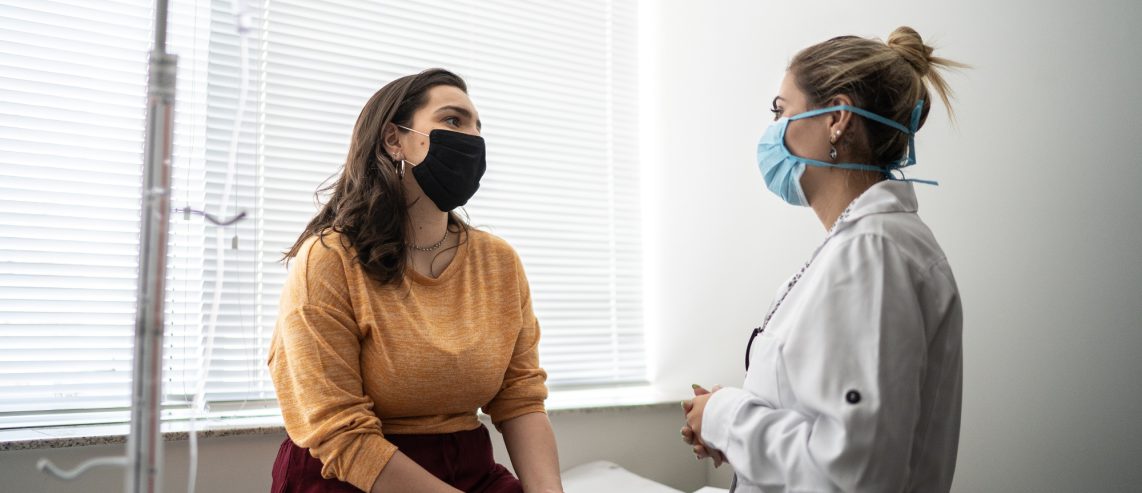COVID-19 vaccines can affect a woman’s menstrual cycle — but those changes are temporary and minor.
Researchers found that the vaccine may temporarily lengthen the menstrual cycle by about one day. That means the cycle, or the time between periods, may last about 29 days instead of 28 days.
“It shows there’s nothing to be alarmed about,” says Julie Rios, MD, a reproductive and fertility specialist at UPMC Magee-Womens Hospital who was not involved in the study. She also is director of the Division of Reproductive Endocrinology and Infertility at the University of Pittsburgh School of Medicine.
“Even though we are seeing about a one-day difference, it’s temporary. And it’s not changing a woman’s ability to become pregnant.”
Never Miss a Beat!
Subscribe to Our HealthBeat Newsletter!
Thank you for subscribing!
You can now select the specific newsletters you'd like to receive.
You are already subscribed.
Subscribe to more newsletters in our email preference center.
Sorry, an error occurred. Please try again later.
Get Healthy Tips Sent to Your Phone!
Examining Menstrual Cycle Data
Results of the study, which received funding from the National Institutes of Health, appeared in the journal Obstetrics and Gynecology in January.
Researchers analyzed data on menstrual cycle length entered on a fertility tracking app by nearly 4,000 women ages 18 to 45. Researchers looked at six months’ worth of menstrual cycle data for each participant. They compared menstrual cycle length (time between bleeding) and menses (days of bleeding).
More than half of the women were vaccinated, and the rest were unvaccinated. For those who were vaccinated, researchers compared data from three menstrual cycles before and after they received their COVID-19 shot.
The study showed:
- Women who received a COVID-19 vaccine had a less than one-day increase in the length of their menstrual cycle.
- Those who received their first and second vaccines during the same menstrual cycle experienced a two-day increase in the length of their menstrual cycle.
- All changes were temporary and within normal range.
- Vaccines had no impact on the number of days the women had menstrual bleeding.
Normal Menstrual Cycle Changes
A normal menstrual cycle is 25 to 35 days with an average of 28 days, says Dr. Rios. While the study shows COVID-19 vaccines had a temporary effect on the cycle length, a one- or two-day change is considered normal.
“Women are still having healthy periods. The COVID vaccine is not impacting fertility,” Dr. Rios says.
Researchers aren’t sure exactly why the changes are occurring. But Dr. Rios points out that any kind of physical or emotional stress on the body can impact the menstrual cycle. The slight changes confirmed in the study are likely due to the fever and other side effects resulting from the body’s immune response to the vaccination, she says.
“We know that stress can affect the menstrual cycle in various ways. But in this case, it goes back to normal,” she says.
Why Getting Vaccinated Is Important
Dr. Rios says the benefits of vaccination against COVID-19 are clear. She encourages all women — especially those who are pregnant or want to become pregnant — to get the vaccine.
Unvaccinated pregnant women who get a COVID infection have poorer outcomes. They are more likely to be admitted into a hospital and into intensive care, be put on a ventilator, and have a higher risk of stillbirth and maternal death, she says.
“As a fertility specialist, the biggest question I get about the vaccine is: ‘Will I still be able to get pregnant?’” Dr. Rios says.
“I encourage them to get vaccinated because it’s not going to impact their ability to get pregnant. And it could protect them, so they have a healthier pregnancy.”
For more information, view the roundtable discussion with UPMC Magee-Womens experts answering questions about the COVID vaccine safety during and before pregnancy.
About UPMC Magee-Womens
Built upon our flagship, UPMC Magee-Womens Hospital in Pittsburgh, and its century-plus history of providing high-quality medical care for people at all stages of life, UPMC Magee-Womens is nationally renowned for its outstanding care for women and their families.
Our Magee-Womens network – from women’s imaging centers and specialty care to outpatient and hospital-based services – provides care throughout Pennsylvania, so the help you need is always close to home. More than 25,000 babies are born at our network hospitals each year, with 10,000 of those babies born at UPMC Magee in Pittsburgh, home to one of the largest NICUs in the country. The Department of Health and Human Services recognizes Magee in Pittsburgh as a National Center of Excellence in Women’s Health; U.S. News & World Report ranks Magee nationally in gynecology. The Magee-Womens Research Institute was the first and is the largest research institute in the U.S. devoted exclusively to women’s health and reproductive biology, with locations in Pittsburgh and Erie.
